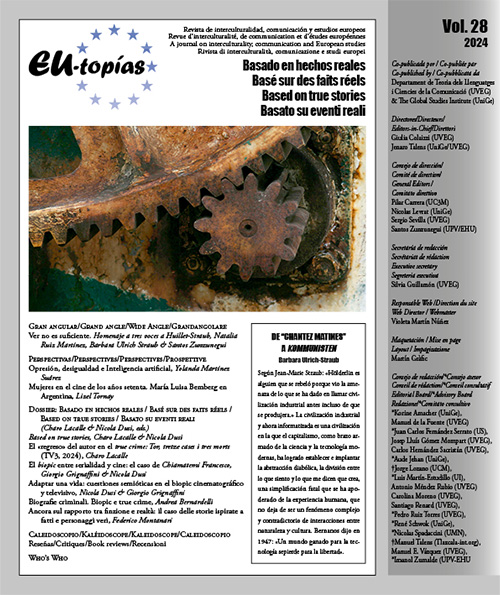Oppression, Inequality and Artificial Intelligence
DOI:
https://doi.org/10.7203/eutopias.28.29053Keywords:
Oppression, emancipation, algorithm, context, violence, Young, Haraway Abstract
Abstract
At a time of profound changes in the way we live and coexist, such as those brought about by current digitalisation, political philosophy is presented as a tool that allows us to approach the technological revolution of artificial intelligence from a critical and emancipatory perspective. From a situated position, this article will reflect on the inequalities that the change places us in front of, pointing out the possibilities. To this end, Young’s five operational categories (exploitation, marginalisation, disempowerment, cultural imperialism and violence) will be applied to artificial intelligence, allowing us to diagnose injustices and point to possible solutions. From a feminist perspective, we will question the supposed neutrality of AI and analyse the effects, intended and unintended, of the digitalisation of society. It will conclude with the need to propose a series of changes that will bring us closer to a more inclusive digitalisation.
 Downloads
Downloads
 References
References
Agra Romero, María Xosé ¿Olvidar a Clitemnestra? Sobre justicia e igualdad. Santiago de Compostela: Universidade de Santiago de Compostela Editora, 2016.
Berger, Peter L. y Luckmann, Thomas. La construcción social de la realidad. Buenos Aires: Amorrotu editores, 2001.
Coeckelbergh, Mark. La filosofía política de la inteligencia artificial. Madrid: Cátedra, 2023.
De Salvador Agra, Saleta y Martínez Suárez, Yolanda. «De injusticias algorítmicas y antilenguas digitales». Periodismo, ciudadanía y política en el escenario digital. Ed María Isabel Míguez-González y Alberto Dafonte-Gómez. Madrid: Dykinson. 2023, pp. 178-195.
Eco, Umberto «El teléfono móvil y la verdad». ¿Dónde estás? Ontología del teléfono móvil. Ed. Maurizio Ferraris. Barcelona: Marbot Ediciones, 2008, pp. 13–15.
Eubanks, Virginia. La automatización de la desigualdad. Herramientas de tecnología avanza-da para supervisar y castigar a los pobres. Madrid: Capitán Swing, 2021.
Bengio, Yoshua et al [en línea]: «Pause Giant AI Experiments: An Open Letter», en Future of Life Institute (22/03/2023), https://futureoflife.org/open-letter/pause-giant-ai-experiments/ Recuperado el 29 de febrero de 2024.
Gutiérrez, Miren. «Algoritmos y desigualdad». Revista de Occidente, 502, 2023, pp. 47–59.
Haraway, Donna J. «Manifiesto para cyborgs: ciencia, tecnología y feminismo socialista a fina-les del siglo XX». Ciencia, cyborgs y mujeres. La reinvención de la naturaleza. Ed. Donna J. Haraway. Madrid: Cátedra, 1995, pp. 251–311.
Lasswell, Harold. «Estructura y función de la comunicación en la sociedad». Sociología de la comunicación de masas. Ed. Miquel de Moragas Spá. Barcelona: Gustavo Gili, 1979, pp. 158–172.
Martínez Suárez, Yolanda y de Salvador Agra, Saleta. «Digital snails?: Shuar women and mobile communication in Ecuador». Gendered power and mobile technology: intersections in the Global South. Ed. Caroline Wamala Larsson y Laura Stark. London/NY: Routlegde, 2019, pp. 166-177.
Martínez Suárez, Yolanda, de Salvador Agra, Saleta y de Salvador González, Xabier. «Triplemente marcadas: desconexiones comunicativas en la Amazonía sur ecuatoriana». Cuadernos.info, 36, 2015, pp. 89–107. https://doi.org/10.7764/cdi.36.716
Monasterio, Aníbal. «Automatizando la toma de decisiones morales: inteligencia artificial y me-jora humana». Más que humanos. Biotecnología, inteligencia artificial y ética de la mejora. Ed. Francisco Lara y Julián Savalescu. Madrid: Tecnos, 2021, pp. 255–281.
O’Connell, Mark. Como ser una máquina. Madrid: Capitán Swing, 2019.
Ortiz De Zárate Alcarazo, Lucía. «Sesgos de género en la inteligencia artificial». Revista de Occidente, 502, 2023, pp. 5–20.
Paniagua, Esther. Error 404 ¿Preparados para un mundo sin internet? Madrid: Debate, 2021.
Perrigo, Billy [en línea]: «Exclusive: OpenAI Used Kenyan Workers on Less Than $2 Per Hour to Make ChatGPT Less Toxic», en Time (18/01/2023), https://time.com/6247678/openai-chatgpt-kenya-workers/ Recuperado 29 de febrero de 2024.
Petrone, Francesco. «Nuevas tecnologías y viejas formas de opresión». Robótica, ética y política. El impacto de la superinteligencia en el mundo de las personas. E. Norbert Bilbeny. Barcelona: Icaria Editorial, 2022, pp. 239- 267.
Ravn, Olga. Los empleados. Barcelona: Anagrama, 2023.
Sanuy, Ada [en línea]: «Elon Musk presenta xAI, su proyecto de IA formado exclusivamente por hombres», en La Vanguardia (14/07/2023), https://www.lavanguardia.com/tecnologia/20230714/9106465/elon-musk-presenta-xai-empresa-inteligencia-artificial-pmv.html Recuperado el 29 de febrero de 2024.
Van Dijk, Teu A. Dominación étnica y racismo discursivo en España y América Latina. Barcelona: Gedisa editorial, 2008.
Velasco, Lucía. «No es “sólo un insulto”. La vida digital y la violencia contra las mujeres». Re-vista de Occidente, 502, 2023, pp. 34–46.
Velasco, Lucía. ¿Te va a substituir un algoritmo? Madrid: Turner Libros, 2021.
Young, Iris Marion. La justicia y la política de la diferencia. Madrid: Cátedra, 2000.
Downloads
Published
How to Cite
-
Abstract114
-
PDF (Español)36
Issue
Section
License
![]()
The authors conserve the copyright. All content published in EU-topías. Journal of interculturality, Communication, and European Studies are subject to the license Creative Commons Attribution-NonCommercial-ShareAlike 4.0 license. The full text of the license can be found at <http://creativecommons.org/licenses/by-nc-sa/4.0>
They may be copied, used, disseminated, transmitted and publicly displayed, provided that:
- The authorship and original source of the publication is cited (journal, publisher and URL of the work).
- They are not used for commercial purposes.
- The existence and specifications of this license of use are mentioned.
It is the responsibility of the authors to obtain the necessary permissions for images that are subject to copyright.



